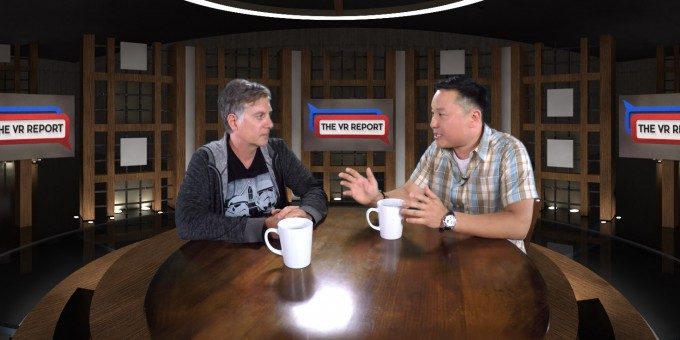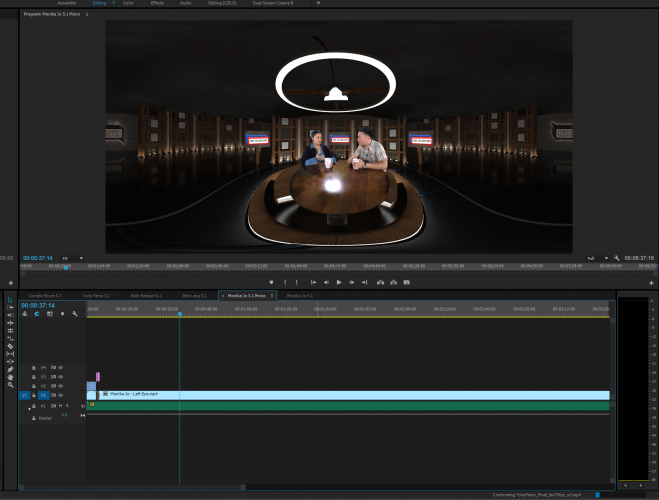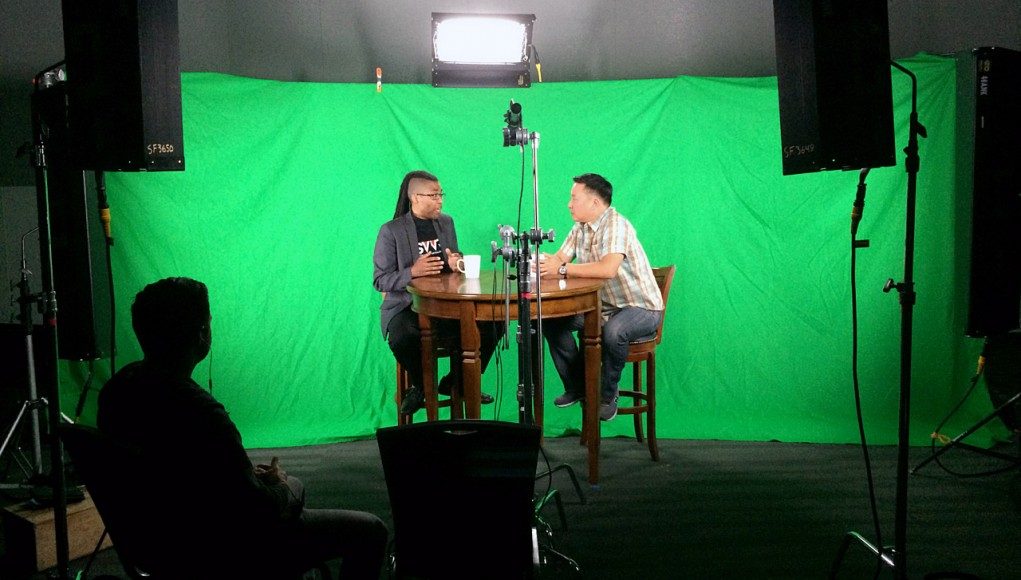Ushering in the era of immersive entertainment, The VR Report introduces a unique new talk show format featuring an immersive stereographic 360-degree virtual reality experience. Viewers get to sit down face-to-face in a virtual reality environment with a variety of luminaries and pioneers in the rapidly growing VR industry. Hosted by David Gene Oh who works in VR leading developer relations at Leap Motion. The show is an open forum catered towards the VR community, both enthusiast and the uninitiated.
Road to VR recently sat down with the two filmmakers behind The VR Report—Lex Halaby (director) and Kevin Ping Chang (producer)—to learn more about the concept and production processes behind the show.
See Also: ‘The VR Report’ Virtual Reality Talkshow Interviews Road to VR’s Ben Lang
Road to VR (Q): What’s your experience in filmmaking; what brought you to VR?
Lex Halaby (A): I come from a ‘traditional’ filmmaking background with director credits on films, commercials, and music videos. Over the years I’ve collaborated with many talented actors like Samuel L. Jackson (Star Wars Episodes I-III), Fred Armisen (SNL / Portlandia), and Martin Starr (Silicon Valley), to name a few. Like many of us, when I first experienced VR two years ago I couldn’t wipe the smile off my face and decided to jump head first into the medium.
After a many months of R&D, I designed and built a 360 stereographic VR camera system for KCRW (the flagship National Public Radio station of Southern California) and directed their first VR experience with the band Death Cab For Cutie. Since then it’s been a wild ride as the VR space continues to expand. Some recent clients include Tesla Motors, Warner Brothers, Funny or Die, and ABC Digital. It’s an exciting time and I’m so thankful to be part of the growing community.
Kevin Ping Chang (A): I come from the world of feature film and television producing where I am currently working on the feature adaptation for Sony’s acclaimed video game, Shadow of the Colossus (2005); a sci-fi thriller based off the award winning short, A.B.E.; and an original genre-bending idea called Yellowstone Falls.
Like most, I was absolutely blown away by my first VR experience which, to its credit, was the Sony PlayStation VR Castle demo. As a storyteller, it was quite obvious how this was a game changer and really opens up the possibilities with narrative. And though The VR Report is non-scripted, we felt that at its core, this show was about the stories, anecdotes and discussions with folks in the VR community, and what better way to share those than in VR?

Road to VR (Q): What was the inspiration for The VR Report?
Kevin Ping Chang (A): The project came together over the course of a dinner—as often times they do—where myself, David, and Lex just wanted to break bread and chat about VR. We all shared the same collective excitement for the possibilities of VR and talked about how fast everything was developing. Given this, we realized we were at an interesting and special time seeing the rebirth of virtual reality and felt there was a unique opportunity to document this by bringing this generation’s VR pioneers together in order share their stories.
Road to VR (Q): What’s different about traditional film vs. VR film?
Lex Halaby (A): The sense of presence you experience in VR gives the viewer a level of intimacy you cannot get through any other medium. There’s a trend towards overstimulation in VR right now and while that works for certain types of experiences, we wanted to prove VR can take something as simple as a conversation to a whole other level. When you’re sitting at the table there are no distractions, comment feeds, banner ads, or email notifications. You’re fully present, as if you are sitting across from a friend at lunch—unless you’re a bad friend and constantly checks your email during lunch… in that case there’s no hope for you, you’re just a horrible person.
Kevin Ping Chang (A): To Lex’s point, as a medium, the immersive quality of VR is unparalleled and there is a different level of engagement from traditional media. Given the user has control of what she or he is experiencing, this presents some interesting challenges as far as storytelling goes as well as the cinematic language for constructing a VR experience. As the VR industry continues to progress, I am sure we will see some very interesting and innovative experiences from content creators. It is going to be quite exciting.

Road to VR (Q): Having been a guest on the show, I know it’s shot on a green screen. Tell me about the technical process of The VR Report. How is it different than more traditional workflows?
Kevin Ping Chang (A): I’ll defer to our wunder-director, Lex Tiberius Halaby, for this one.
Lex Halaby (A): For the record my middle name isn’t Tiberius, but I’ll gladly accept the title of “wunder-director” if it comes with a pay raise. Oh it doesn’t?… Anyway, there are some similarities to existing workflows but the addition of 3D and a virtual set make the process more complex. A few years back I directed a series of 3D films for Panasonic to show off their high refresh rate 3D televisions and learned the tricks of trade for stereographic filmmaking.
I combined that skill set with my background in visual effects to design The VR Report’s workflow. My team and I worked hard to streamline the process and make sure we can generate hours of engaging VR content without having to reinvent the wheel every episode. It’s a big part of what makes the show so unique and I’m really proud of what we’ve accomplished.
Road to VR (Q): Is there a longer term vision for the The VR Report?
Kevin Ping Chang (A): The response from the community, from enthusiasts to folks trying VR for the first time, has been very positive and we couldn’t be happier with the support we have gotten. As the VR audience grows, we hope to continue bringing more guests from the industry to the community.
We are still finishing out the first season which has been an ambitious undertaking on its own and are just starting to build the line up for a second season. This has been such a personal project for the three of us and ultimately we’d love to find a partnership through sponsorship, a platform, or even a billionaire donor to help build a sustainable pipeline and allow us to continue bringing this show to the community on a consistent basis.
Lex Halaby (A): We’re at this unique point in the medium’s rebirth where there are many ‘firsts’. We’re proud that The VR Report broke ground as a VR talk show and we want to continue being leaders in this space. With new tools being developed every day, we’re pushing to keep the show on the cutting edge. We truly believe what benefits the show also benefits the community. From game developers to filmmakers to cultural anthropologists, the industry is incredibly diverse and we want to represent its many voices. It’s an amazing time for consumer VR and we want to capture this moment in the medium’s history in the best way possible: by putting you right at the table experiencing it for yourself.
Released weekly, the The VR Report can be viewed in virtual reality through Samsung’s Gear VR (via Milk VR), YouTube 360, Vrideo, and Littlstar. To get more information about the show you can visit The VR Report website or contact the creators directl at TheVRReport@gmail.com.







